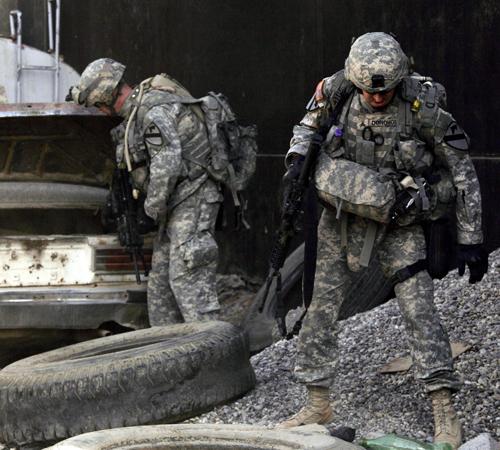Military: 2007 bloodiest year in Iraq for U.S.

Erica Magda
Nov 7, 2007
Last updated on May 12, 2016 at 06:24 p.m.
BAGHDAD – The U.S. military announced six new deaths Tuesday, making 2007 the bloodiest year for American troops in Iraq despite a recent decline in casualties and a sharp drop in roadside bombings that Washington links to Iran.
With nearly two months left in the year, the annual toll is now 853 – three more than the previous worst of 850 in 2004.
But the grim milestone comes as the Pentagon points toward other encouraging signs as well – growing security in Baghdad and other former militant strongholds that could help consolidate the gains against extremists.
A senior Navy officer, meanwhile, announced the planned release of nine Iranian prisoners and was at pains to say that a major cache of Iranian-made weapons and bombs displayed for reporters Tuesday appeared to have been shipped into Iraq before Tehran made a vow to stop the flow of armaments.
Get The Daily Illini in your inbox!
Defense Secretary Robert Gates said last week that Iran had made such assurances to the Iraqi government. He did not reveal when the pledge was issued.
A decline in Iranian weapon deliveries could be one of several factors for the decrease in both Iraqi and American deaths over the past two months.
“It’s our best judgment that these particular EFPs … in recent large cache finds do not appear to have arrived here in Iraq after those pledges were made,” Rear Adm. Gregory Smith, director of the Multi-National Force-Iraq’s communications division, told reporters Tuesday.
Among the weapons Washington has accused Iran of supplying to Iraqi Shiite militia fighters are EFPs, or explosively formed projectiles. They fire a slug of molten metal capable of penetrating even the most heavily armored military vehicles, and thus are more deadly than other roadside bombs.
The No. 2 U.S. commander in Iraq, Lt. Gen. Ray Odierno, said last week that there had been a sharp decline in the number of EFPs found in Iraq over the last three months. At the time, he and Gates both said it was too early to tell whether the trend would hold, and whether it could be attributed to action by Iranian authorities. Iran publicly denies that it has sent weapons to Shiite militias in Iraq.
Two of the Iranians who will be freed “in the coming days” were among five captured in January in a U.S. raid on an Iranian government facility in Irbil, the capital of Iraq’s autonomous Kurdish region in the north of the country.
The Americans said the five were members of Iran’s elite Quds Force, an arm of the Revolutionary Guards. Iran said the five were diplomats working in a facility that was undergoing preparations to be a consular office.
Smith told reporters the identities of the nine Iranians would be released later. He said the decision to release the nine was made after they were determined not to be a threat to U.S. forces.
The positive moves toward Iran on Tuesday coincided with the opening of two Iranian consulates, the facility in Irbil that was shut by American forces after the raid, and a second in Sulaimaniyah, the largest city in the Kurdish zone.
Kurdish Prime Minister Nechirvan Barzani and Iranian Ambassador Hassan Kazemi Qomi inaugurated the building in Irbil and said both would have full diplomatic status.
“This is a very important step to enhance relations and facilitate the commerce between the two sides,” Barzani told reporters.
The Iranian ambassador charged the United States ran roughshod over Iraqi sovereignty in conducting the raid in January.
“The American forces breached Iraqi sovereignty by detaining the five Iranian diplomats at this same office in Irbil,” Qomi said.
“Iran has strong ties with Iraqi society, and opening these consulates will strengthen these ties. It will also strengthen commerce and travel between the two sides,” Qomi said.
The U.S.-backed Iraqi government has close ties to neighboring Iran, and Iraqi Prime Minister Nouri al-Maliki has sought to bring the antagonists together in hopes that would reduce violence.
Iraqi Kurds, like the country’s Shiite Arabs, maintain close ties with Shiite-dominated Iran, despite their warm relationship with the United States.





